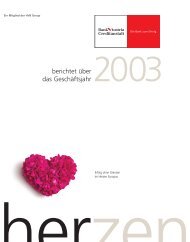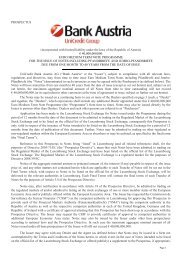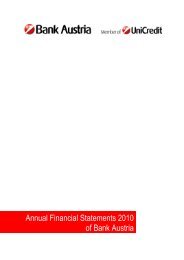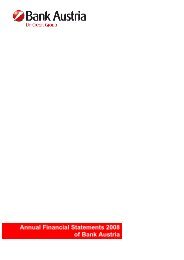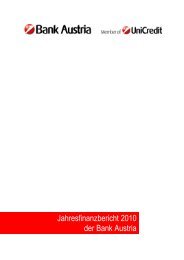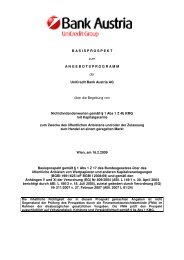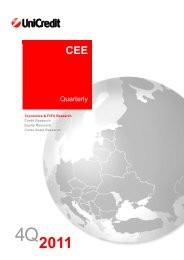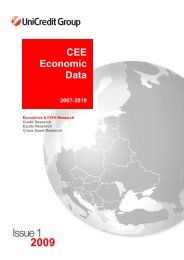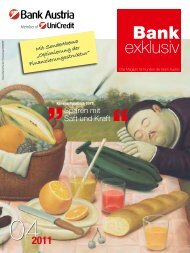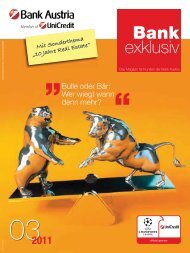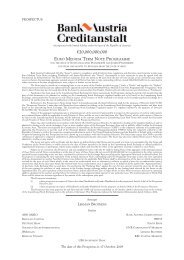Annual Financial Statements 2011 of Bank Austria
Annual Financial Statements 2011 of Bank Austria
Annual Financial Statements 2011 of Bank Austria
You also want an ePaper? Increase the reach of your titles
YUMPU automatically turns print PDFs into web optimized ePapers that Google loves.
Consolidated <strong>Financial</strong> <strong>Statements</strong> in accordance with IFRSs<br />
E – Risk report (CoNTINuED)<br />
Current status <strong>of</strong> the application <strong>of</strong> the internal ratings-based approach (IRB approach)<br />
to credit risk in the <strong>Bank</strong> <strong>Austria</strong> Group<br />
UniCredit <strong>Bank</strong> <strong>Austria</strong> AG has applied the internal ratings-based approach since March 2008, using its own estimates <strong>of</strong> loss given default and <strong>of</strong><br />
conversion factors for the major part <strong>of</strong> its loan portfolio (advanced IRB approach).<br />
The bank is planning to introduce various other Group-wide models while also further refining and developing local models.<br />
Banca d’Italia (the <strong>Bank</strong> <strong>of</strong> Italy), the home supervisor <strong>of</strong> UniCredit Group, is responsible for all approvals at Group level, while local supervisory<br />
authorities are responsible for local topics in the legal entities and for local on-site reviews. Regulatory issues are being dealt with in close<br />
cooperation between home and host regulators (college <strong>of</strong> supervisors).<br />
Implementation <strong>of</strong> the advanced IRB approach has been established as a Group-wide programme. Therefore UniCredit is responsible for Groupwide<br />
decisions and guidelines as well as for the development <strong>of</strong> Group-wide models. For example, Group-wide homogeneous portfolios have been<br />
defined for which uniform rating models are used across the Group, such as those for countries, banks and multinational companies.<br />
Group standards have for the most part already been prepared and adopted by the UniCredit Group holding company in cooperation with the<br />
major IRB legal entities, and are used as an instrument for uniform Group-wide implementation, with a view to complying with local legal requirements<br />
– some <strong>of</strong> which differ from country to country – and safeguarding Group interests. These Group standards will continue to be gradually<br />
extended and complemented.<br />
The Group standards continue to be integrated step by step in the processes and organisational set-up <strong>of</strong> all business areas and Group units, with<br />
account being taken <strong>of</strong> local features and legal requirements in ensuring Basel 2 compliance.<br />
<strong>Austria</strong>n subsidiaries<br />
All <strong>Austria</strong>n subsidiaries <strong>of</strong> UniCredit <strong>Bank</strong> <strong>Austria</strong> AG started to use the standardised approach in 2008. From a current perspective, for reasons<br />
<strong>of</strong> materiality, it is not planned to switch to one <strong>of</strong> the IRB approaches.<br />
CEE subsidiaries<br />
The CEE subsidiaries have used the standardised approach to credit risk since the beginning <strong>of</strong> 2008. Based on a detailed roll-out plan, there are<br />
plans to switch to the advanced IRB approach at most <strong>of</strong> the CEE banking subsidiaries in line with the Group’s decision to use the advanced IRB<br />
approach. According to the detailed roll-out plan communicated to the supervisory authorities involved, the switch to the A-IRB approach takes<br />
place at the relevant CEE subsidiaries step by step. Most subsidiaries start with the Foundation IRB approach (F-IRB).<br />
In the course <strong>of</strong> the cross-border approval process, supervisory IRB assessments took place in an initial group <strong>of</strong> CEE subsidiaries in 2010. For<br />
the CEE subsidiaries UniCredit Bulbank AD, UniCredit <strong>Bank</strong> Czech Republic, a.s., and UniCredit <strong>Bank</strong> Slovenija d.d., the application <strong>of</strong> the F-IRB<br />
approach was approved as at 1 January <strong>2011</strong>. The application <strong>of</strong> the F-IRB approach at UniCredit <strong>Bank</strong> Hungary Zrt. was approved as at 1 July<br />
<strong>2011</strong>. Further approvals for the application <strong>of</strong> the F-IRB approach at the CEE subsidiaries UniCredit Tiriac <strong>Bank</strong> S.A. and UniCredit <strong>Bank</strong> Slovakia<br />
a.s. are expected for 2012.<br />
Current status <strong>of</strong> the application <strong>of</strong> the advanced measurement approach (AMA)<br />
for operational risk in the <strong>Bank</strong> <strong>Austria</strong> Group<br />
UniCredit <strong>Bank</strong> <strong>Austria</strong> AG has used the AMA since the beginning <strong>of</strong> 2008.<br />
<strong>Austria</strong>n subsidiaries<br />
Schoellerbank has applied the AMA in the area <strong>of</strong> operational risk since 2009.<br />
CEE subsidiaries<br />
In the reporting period, approval for the use <strong>of</strong> the AMA in the area <strong>of</strong> operational risk was available for the banking subsidiaries in the Czech Republic,<br />
in Slovakia, Hungary, Slovenia, Croatia, Bulgaria and Romania. In the next few years, AMA preparations will concentrate on ZAO UniCredit<br />
<strong>Bank</strong> Russia, Yapı ve Kredi <strong>Bank</strong>asi AS and UniCredit <strong>Bank</strong> Serbia JSC.<br />
<strong>Bank</strong> <strong>Austria</strong> · <strong>Annual</strong> <strong>Financial</strong> <strong>Statements</strong> <strong>2011</strong><br />
137



